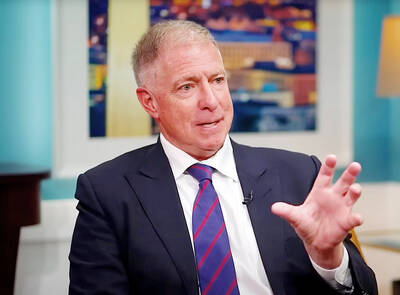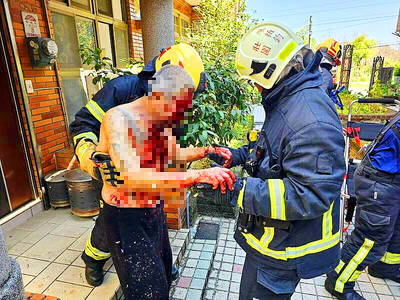Former president Chen Shui-bian (陳水扁) was found not guilty by the Taiwan High Court yesterday of directing his aides to give false testimony to prosecutors who were probing his alleged misuse of a special state affairs fund.
The High Court ruling overturned one handed down by the Taipei District Court in July last year, in which Chen was sentenced to two months in jail on charges of urging Ma Yung-cheng (馬永成) and Lin Teh-hsun (林德訓) — who headed Chen’s office at different times during his two terms as president from 2000 to 2008 — to make untrue statements.
The district court ruled that Chen had asked the pair to tell prosecutors that the state affairs fund was used for secret diplomatic operations rather than being pocketed by the first family.
Also, Chen had wanted them to say that his wife, Wu Shu-jen (吳淑珍), had never used invoices provided by other people to pocket cash from the fund, according to the district court ruling.
Lin was handed a two-month sentence by the Supreme Court in November last year for perjury — Ma was not indicted in the case.
However, the High Court found that before Lin gave his testimony on Aug. 8, 2006, the prosecutors had not informed him that he had the right to refuse to testify.
Under these circumstances, Lin’s actions did not constitute perjury, even if he had lied to prosecutors that day, the High Court said.
Moreover, there was no evidence proving that Chen had instructed Lin and Ma to give false testimony, the court said.
Chen is currently serving a 17-and-a-half-year sentence for taking bribes in a land development project and for influencing the appointment of a chairwoman at the Taipei 101 tower.
In August last year, the High Court ruled that Chen was not guilty of embezzling state affairs funds, although he was given an extra 10-month prison term for his role in using fraudulent receipts to pocket reimbursements for expenditure from the special fund. The prosecution is currently appealing the verdict.

A total lunar eclipse coinciding with the Lantern Festival on March 3 would be Taiwan’s most notable celestial event this year, the Taipei Astronomical Museum said, urging skywatchers not to miss it. There would be four eclipses worldwide this year — two solar eclipses and two lunar eclipses — the museum’s Web site says. Taiwan would be able to observe one of the lunar eclipses in its entirety on March 3. The eclipse would be visible as the moon rises at 5:50pm, already partly shaded by the Earth’s shadow, the museum said. It would peak at about 7:30pm, when the moon would

DEFENSE: The US should cancel the US visas or green cards of relatives of KMT and TPP lawmakers who have been blocking the budget, Grant Newsham said A retired US Marine Corps officer has suggested canceling the US green cards and visas of relatives of opposition Taiwanese lawmakers who have been stalling the review of a proposed NT$1.25 trillion (US$39.7 billion) special defense budget. The Executive Yuan has proposed the budget for major weapons purchases over eight years, from this year to 2033. However, opposition lawmakers have refused to review the proposal, demanding that President William Lai (賴清德) first appear before the Legislative Yuan to answer questions about the proposed budget. On Thursday last week, 37 bipartisan US lawmakers sent a letter to Legislative Speaker Han Kuo-yu (韓國瑜), the heads

Two siblings in their 70s were injured yesterday when they opened a parcel and it exploded, police in Yilan said, adding the brother and sister were both in stable condition. The two siblings, surnamed Hung (洪), had received the parcel two days earlier but did not open it until yesterday, the first day of the Lunar New Year holiday in Taiwan, police said. Chen Chin-cheng (陳金城), head of the Yilan County Government Police Bureau, said the package bore no postmark or names and was labeled only with the siblings’ address. Citing the findings of a

A New York-based NGO has launched a global initiative to rename the nation’s overseas missions, most of which operate under the name "Taipei," to "Taiwan Representative Office (TRO)," according to a news release. Ming Chiang (江明信), CEO of Hello Taiwan, announced the campaign at a news conference in Berlin on Monday, coinciding with the World Forum held from Monday through Wednesday, the institution stated in the release. Speaking at the event, Democratic Progressive Party Legislator Huang Jie (黃捷) said she believed this renaming campaign would enable the international community to see Taiwan